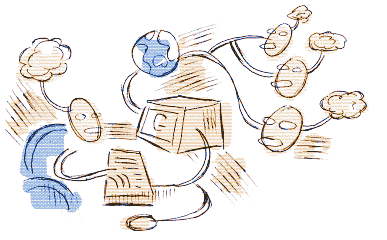Tuesday, April 6, 2004
IE Search Shortcut
After you’ve installed the Google toolbar, you can also directly enter search words into Internet Explorer and press Shift + Tab, then Return (or just press Return, but then you will have to wait until the browser realized this is not a valid HTTP address).
For this shortcut to work, the option “Use Google as my default search engine in Internet Explorer” must be checked in the Google toolbar options. Note you can also hide the toolbar for this to work.
The Google OS
The previously mentioned Google OS meme has taken off and arrived at Kottke.org: GooOS, the Google Operating System. Following up on the G-mail trend Kottke introduces Goffice – the Google Office. Kottke predicts “Google will be the biggest and most important company in the world in 5-8 years.” (Hmm, aren’t they now? After IKEA, that is.)

From the original Google OS post:
“Google has taken the last 10 years of systems software research out of university labs, and built their own proprietary, production quality system. What is this platform that Google is building? It’s a distributed computing platform that can manage web-scale datasets on 100,000 node server clusters. It includes a petabyte, distributed, fault tolerant filesystem, distributed RPC code, probably network shared memory and process migration. And a datacenter management system which lets a handful of ops engineers effectively run 100,000 servers. Any of these projects could be the sole focus of a startup. (...)
While competitors are targeting the individual applications Google has deployed, Google is building a massive, general purpose computing platform for web-scale programming.
This computer is running the world’s top search engine, a social networking service, a shopping price comparison engine, a new email service, and a local search/yellow pages engine. What will they do next with the world’s biggest computer and most advanced operating system?”
– Skrenta, The Secret Source of Google’s Power (Topix.net), April 04, 2004
How Gmail Handles Deleted Mails
“Google has promoted free storage for each user of the equivalent of 500,000 pages of email among Gmail’s benefits. (...)
However, its terms of use acknowledge that “residual copies of email may remain on our systems, even after you have deleted them from your mailbox or after the termination of your account”.
“If a person deletes an email, he should be confident that email is actually deleted,” Bits of Freedom founder Maurice Westerling said.”
– Google’s Gmail sparks privacy row (BBC News), 5 April, 2004
Interestingly enough, I can’t find this part in Gmail’s TOS anymore (in case it ever was there). The Gmail Terms of Use only talks about residual copies when the account is terminated. The TOS does not mention deleted emails at all.
Update: Readers David, Eric and Gary emailed the part of Gmail’s pages where indeed Google Inc states they won’t necessarily delete emails after you delete them: www.google.com/gmail/help/privacy.html. Thanks for the pointer.
Update 2: Orkut member Joseph quotes the following Yahoo Mail privacy statement, along the lines of what Google writes: “Please note that any information that we have copied may remain in back-up storage for some period of time after your deletion request.” (At the moment there are 86 hits for this phrase in Google, from very different web sites.)
And not only that, the Yahoo Privacy terms state: “Yahoo! displays targeted advertisements based on personal information.”
Gmail Secret Question
Equally strange*; via Gmail’s password assistance page, you can find out the secret question as well as secondary email of any Gmail account. I entered the following:
- Larry Page: Your ? - page@google.com
- Sergey Brin: What is your library card number ? - sergey@google.com
- Wayne Rosing: The rain in spain ? - wrosing@lco.org
- Jonathan Rosenberg: What is your Mother’s maiden name ? - jonathan@google.com
- Shona Brown: What is your Mother’s maiden name ? - shona@google.com
- Urs Hoelzle: In which hospital were you born ? - urs@google.com
*See previous post on Gmail accounts.
>> More posts
Advertisement
This site unofficially covers Google™ and more with some rights reserved. Join our forum!
